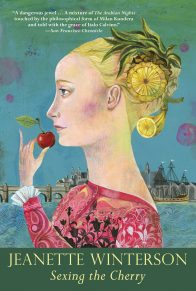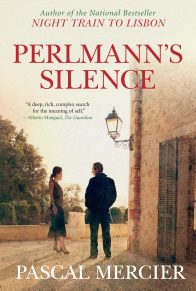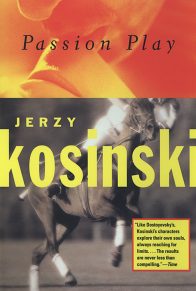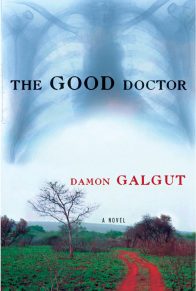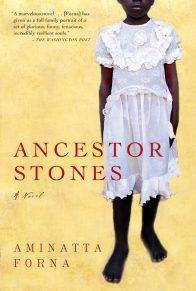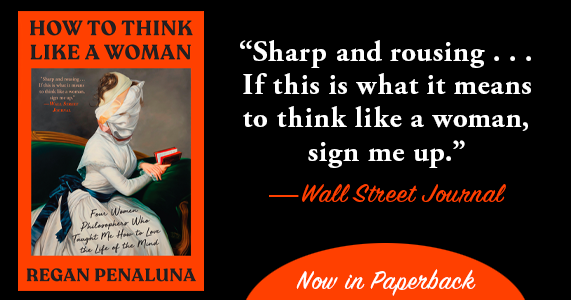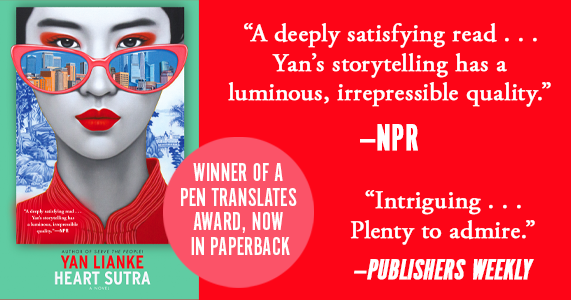He sat for a while and looked. He stared at the lines on his palm. He started to say something. But it was too hot to speak. He said nothing. He shook his head once briefly, perhaps to shake a fly from his face.
Then he stood and began to move again, tottering down that empty white trail. He looked like a figure fired in a kiln, still smoking slightly and charred. A gull followed him for a while, hovering above his head, white and mewling. He stopped and threw a stone at it and it veered away to one side, tilting on its wings. It vanished over the grass, going towards the sea.
The road curved left. It went up a rise and then he himself could see the water, flat and endless as it moved in on the shore. He wanted to go to it. There was a bed of brittle reeds between the road and the beach and he moved between the dry, crackling stalks. He came to the sand, which was white and fine, marked as though with music by the lines of ancient tides. Shells and weed, skeletons of crabs.
He hung his clothes as he undressed on a piece of saltwhitened driftwood that stuck up out of the sand. His clothing was a peculiar mixture of articles. The boots looked military and so did the socks. His shirt was red cotton with irregular white buttons and had been pilfered in passing from some nameless settlement somewhere. The blue pants were likewise stolen from a washing-line near the city. He took them off and then he was naked in the cold wash of sun. His body was bizarrely quilted in areas of sunburn and whiteness, cleanness and dirt. He was a harlequin.
He went down to the water. There were gulls eddying above him again. He ignored them. He waded out a little way till the water reached his knees. It was cold.
He washed himself. There was a quality to his movements that was perfunctory and detached so that all activity was one. Crying or washing, it was the same to him. He scooped handfuls of the freezing water over his back, his face. He scoured his skin with sand. Then he waited for a time with his hands at his sides and gazed at the thin shell of the horizon which seemed inscribed in ink and which curved across all he could see of the world.
He went back to the beach. His clothes were where he’d left them, hanging on the piece of driftwood, and for a few moments he looked at these pieces of cloth with surprise. He had no memory of leaving them there and it seemed to him for a moment that they belonged to someone else. Then he remembered. He dressed again slowly, the material sticking to the damp places on his skin. The clothes smelled of something or someone or maybe of nothing.
He walked back through the reeds to the road. He went on walking north towards what he didn’t know.
In the late afternoon he came on another figure like him that was moving in the other direction, south. As they drew opposite each other on that empty road they stopped. Now that he stood near another human form it could be seen that he was a big man, very tall. The other man was black, wearing a dark blue suit. They looked at each other warily.
He decided to speak.
“Hello,” he said.
The other man nodded, carefully.
“Where does this road go?” he said. The other man smiled, inscrutably.
‘do you know where I can find water?”
He took the bottle from his pocket to show him.
At this the other became voluble. He was pointing back the way he’d come. He spoke while he did, but in a language the first man didn’t understand. It was high-pitched and rapid. Then he fell silent again and stood still. They looked at each other.
“Goodbye,” he said.
The other man nodded and smiled. “Goodbye,” he said, pronouncing the word laboriously.
They went on their way. They drew slowly away from each other on the pale white road, casting backward glances at each other, like two tiny weights on a surface connected to each other by intricate pulleys and dependent on one another for their continuing motion. Then the black man disappeared around a bend. The road went on, unwinding.
Towards evening he saw a tiny settlement of huts in the distance. Perhaps the other man had come from here. They were a way off to the left, at the sea, and he went down from the road and walked towards them. They were fisherman’s cottages with walls painted white and he could see boats pulled up on the sand. There were children playing in the gravel outside the houses and they stopped and looked at him with dull amazement as he advanced on them out of nowhere. A yellow dog barked at him and another took up the sound and it was in a cacophony of barks and howls that he came into that place and stood at the edge of it, swaying slightly.
Later some men offered him food and for a short while he parleyed with them, crouched on his heels next to a fire, his shadow cast behind him in stuttering, pantomimic elongation along the ground. A wind was coming up and the clouds that were rising earlier were heavy now and lit from within by jarring concussions of light. They shared their fish with him and he ate with his fingers. They offered him beer but he drank water instead from an oily creek at the edge of the cluster of houses. They didn’t ask him his business, where he came from or to where he was going. He spoke little to them. They were curious people, roughened by sun and wind, and their faces were seamed and unknowable under their tight woollen caps. They offered him a bed for the night but he declined politely and set off again into the dark, leaning now into the wind with a tall and plum-coloured sky revealed in explosions of light.
It started to rain soon after. He walked for a while in the silver sheets of water with wind punching him like a fist, but soon came to a culvert under the road. There was water running through it but he found a dry place inside and curled up with a gratitude that he had never felt for any other bed. He slept with a tiredness that was close to death. The storm passed and the clouds went on, passing over the sea. Some night animal invisible except for the scarlet fissures of its eyes came to the mouth of the culvert and stared at him and went on. He slept on, beyond the memory of dreams, and didn’t even twitch in his sleep.
When he woke it was still dark and he came crawling out of the culvert and stretched at the side of the road. The sky was vast and dark and taut and carried in it the myriad points and tracks of stars. He drank water again from a pool at the mouth of the culvert and then set off at that same relentless pace with the sky beginning to whiten on his right. He passed what might have been a farmhouse in the distance with a single light, itself a star, burning in one window and the slow and torpid shapes of labourers bestirring themselves outside. Then the sun, which is also a star, came up as it perhaps always will and the light and heat of it grew across the earth tremendously.
It was good, then, to be walking amid grass that was coloured like roses and air that was soft on the skin. The ground was no longer entirely flat and hillocks rose subtly around him. He passed a tree but it disappeared behind him and no other took its place.
Then the sun was climbing and the air lost its softness and there was no shade. He was going more slowly now than yesterday and there was a roughness to his joints that made it difficult to move. He tried to whistle but no tune came to him and his mouth was too dry, so he stopped. His thoughts were weightless now, unfettered to his life. A small animal of some kind, a mongoose perhaps, squirted softly across the road ahead of him and disappeared into the grass and he didn’t stop. There were distant high calls from birds and termite hills rose here and there like citadels that might once have ruled the world and he went on as though to stop would be to cease altogether.
When he heard the sound ahead, he did not hesitate but went into the grass on the right and closed the yellow sheaves behind him like a curtain. He crouched there on the earth that was hard but warm like the living flesh of some basking reptile and looked out through a gap in the stalks at a small patch of road perhaps ten metres wide and listened to the noise of the engine get closer and louder till it filled and passed through that empty space before him that arena as small and charged as the stage of a theatre and had a vision brief but potent of a blue bakkie in the front of which sat a florid farmer in short sleeves and hat and next to him his fat dour-faced wife and in the back on two metal drums a labourer lying in bone-breaking repose all three of them rendered in perfect profile as though by the brush of a manic painter who was visionary and occasionally brilliant but almost certainly mad. Then the car was gone and there was dust and the grass was shaking. He saw no reason to proceed but slid sideways to the ground and made himself comfortable and was almost instantly asleep as though expunged by some external dispassionate force that erased his mind like a chalk sketch on a blackboard. He dreamed this time but of things long ago that he didn’t know he remembered.
When he awoke this time night was falling and it was under that same but imperceptibly shifted pattern of stars that might mean everything and perhaps nothing at all that he continued on his way, walking now with a motion stiff-legged and strange as though he were partly constructed from straw. Tiny flashes of fire of alien bodies burning as they fell occasionally passed by overhead. He remembered that he was supposed to make a wish but no wish came to him. He walked. Night passed above and he continued to go north at his pace that grew slower and slower. The moon rose at some time before dawn and hung lopsidedly ahead of him like something to which he aspired but then the sun came up and the moon faded till it was merely an outline. He walked as yesterday in the gathering light and heat but felt nothing today of the grace that had infused him. There was a sense inside him of events winding down of springs uncoiled and of wheels slowing and he knew that in his blue and spectral fugue of movement and sleep he was quickly drawing near to the uttermost edge of things.
Then once again he heard the sound of a car behind him. He went as yesterday into the grass at the side of the road but there was a fence here marking the edge of someone’s property. He tangled himself on a piece of barbed wire and by the time he got free there was a cut on one finger that made blood run brightly into his palm. Shit, he said. Shit. He crouched on the ground and stared down at his hand that was marked in this way. By now the car was almost on him and he listened to the noise of the engine and waited for it to pass. But it did not pass. It swelled and drew opposite the place where he lay concealed and then stopped. He lay in silence, listening. He heard a car door open and feet crunching in the road. There was a pause and then a man’s voice uttered some word and he heard the door being opened. Something metal was lifted out and there were other sounds then.
He couldn’t see the road today and he didn’t know who might be there or how many of them there were. But he also knew that the next time he lay down would be the last. There was no reason to hide any more. He stood up slowly and emerged from the grass into the road. He stood there, looking down.
The car was a white Toyota. A thick-set man with a balding skull was crouched down at the rear wheel, which was flat. He wore circular golden spectacles that enlarged his eyes. He was perhaps forty years old.
He stood up, this man, on bowed legs. He seemed about to run. But the moment passed and neither of them moved. Then the driver spoke.
“What do you want?” he said.
The traveller tried to reply but his tongue felt limp and charred and he couldn’t make it work. He wanted to eat and drink and he enacted an expressive mime.
The driver shook his head. Then he looked around and back at the man and sighed.
“Just wait,” he said. “All right?”
The traveller stood in that same place and waited while the driver got down wheezing again into the road and went about changing the tyre. He waited while the other loaded the flat tyre into the boot. Then the side door was opened for him. On the way around the car to the passenger seat the traveller looked into the back and saw boxes and packages piled up and, draped carefully over them, a garment of distinctive colour and cut from which he inferred that the second man was a minister. He got in and the minister shut the door and went back around to his side. He got in too and shut his door. He started the engine.
Now they drove on at speed with the road unspooling through that landscape of grass in which nothing moves except what you dream up in it.
Copyright ” 1995, 2004 by Damon Galgut. Reprinted with permission from Grove Atlantic, Inc. All rights reserved.





